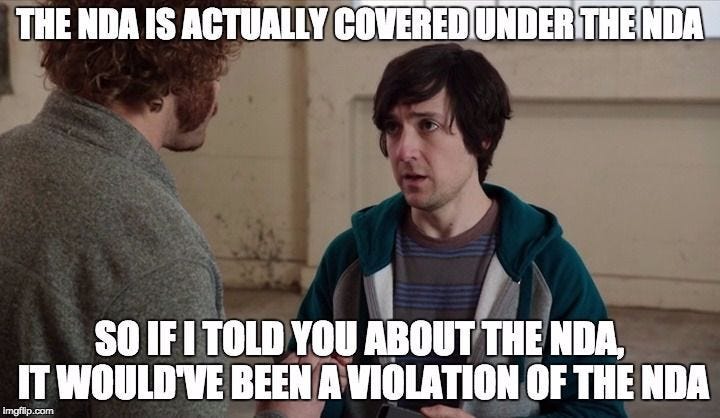Notebook LM vs NDA
Following strong interest in last week’s post on Notebook LM, this week I explore the legality of using AI to analyse an in-production screenplay.
Two weeks ago, I explored how Notebook LM could be used with a series or movie script—and found some genuinely practical applications. That post struck a chord, with many people reaching out to say they were planning to try the tool or were already using it in their day-to-day work. It also prompted a wave of questions and concerns from those interested in using AI tools but unsure what sharing a script with a modern AI might mean—especially in relation to contracts or NDAs.
An NDA is a legal agreement designed to protect confidential details—like scripts, plot twists, casting, or on-set developments—from being disclosed before official release. For obvious reasons, productions don’t want the story to get out. Many are understandably worried that using AI tools like ChatGPT or Notebook LM could constitute a breach of their NDA.
So, this week, I decided to take a closer look at the issue.
Interrogating the Script (Practical use Cases of Notebook LM)
With the initial hype (and panic) surrounding the introduction of ChatGPT and other artificial intelligence tools beginning to settle, the novelty has worn off a little and a sense of practical use has started to take hold. The environment is now more open to real-world applications of large language models. One of the best examples I’ve come across is
What Makes Notebook LM Different?
Before diving into the risks, it’s important to understand how Notebook LM differs from other AI products. It works as a kind of personal research assistant: instead of searching the internet or its own training data, it only interacts with documents you upload. This makes it well suited to summarising individual scenes and finding themes or examples of certain lines or descriptions, tasks which I believe could be very helpful, many of which I explored in my previous post.
Crucially, Notebook LM does not train on the content you provide. It uses the AI to read and answer your questions within the context of the uploaded material—nothing more. Your documents remain tied to your Google account, and the model processes them in a limited, temporary session. They are not stored for training, shared with others, or integrated into the model’s broader intelligence. Put simply: you're not teaching the AI your screenplay; you're asking it a question and getting the answer based on what you provided.
So, Is It an Open-and-Shut Case?
Not quite. While the model may not retain or learn from your script, simply uploading it to a third party could, in some cases, breach an NDA. This depends on how the NDA is worded and interpreted. Additionally, some Notebook LM queries—depending on your account type—may be subject to a “human review” process, where staff can review your queries and results.
Google emphasises that Notebook LM operates in a secure, siloed environment. But even so, their terms and conditions include some nuanced language around privacy. It’s worth considering whether you fully trust the platform—especially given wider concerns around how AI models have been trained.
Recent legal cases, for example, have revealed troubling practices. In one lawsuit, writers including Sarah Silverman alleged that Meta trained its LLaMA model using Library Genesis (LibGen)—a vast and unauthorised archive of books and screenplays. Internal documents reportedly showed that the decision to scrape LibGen was escalated for approval to Zuckerberg himself, even though its legality was in question. While it’s important to point out that Meta is not Google; none of the major AI platforms have covered themselves in glory here and it is worth your time being sceptical about the veracity of their claims.
Sidebar: What is LibGen
If you’re curious whether the productions you've worked on appear in LibGen, The Atlantic has released a searchable tool. A search for Jesse Armstrong, for example, turns up the following results:
Love, Sex and Other Foreign Policy Goals – Jesse Armstrong
Succession – Season Three: The Complete Scripts – Jesse Armstrong
Succession – Season Two – Jesse Armstrong
Succession – Season One – Jesse Armstrong
Succession: Season Four: The Complete Scripts – Jesse Armstrong
The Thick of It: The Missing DoSAC Files – Jesse Armstrong, Armando Iannucci, Simon Blackwell, Tony Roche, Ian Martin
In Summation
Unfortunately, there’s no clear-cut answer here. While it’s highly unlikely (and Google claims, not possible) that your screenplay could be regurgitated elsewhere via Notebook LM or Gemini, some uncertainty remains around just how private your material really is. That said, it's arguably no more risky than saving the same script to iCloud or Google Drive—or emailing it around, as happens routinely in most productions.
For those more cautious about privacy, one option often discussed is using a private, locally run large language model. I haven’t explored this myself yet, but I suspect many of the tasks I set for Notebook LM could be replicated—albeit more clumsily—using the local models currently on the market. And I doubt it’ll be long before a polished, commercially available version arrives.
If in doubt about the policy of your production, please check with the the producers or the network about their AI policy.










